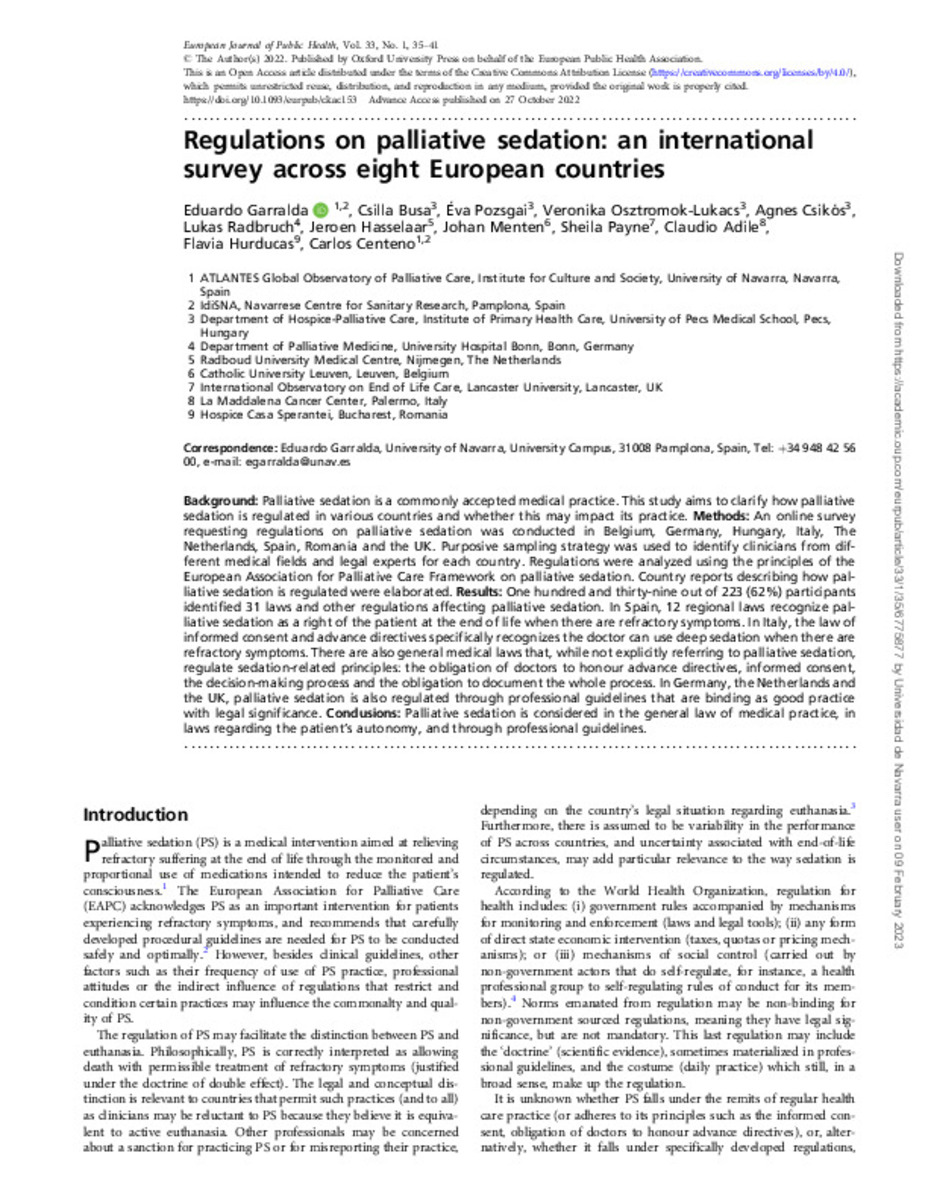Full metadata record
| DC Field | Value | Language |
|---|---|---|
| dc.creator | Garralda, E. (Eduardo) | - |
| dc.creator | Busa, C. (Csilla) | - |
| dc.creator | Pozsgai, E. (Éva) | - |
| dc.creator | Osztromok-Lukacs, V. (Veronika) | - |
| dc.creator | Csikos, A. (Agnes) | - |
| dc.creator | Radbruch, L. (Lukas) | - |
| dc.creator | Hasselaar, J. (Jeroen) | - |
| dc.creator | Menten, J. (Johan) | - |
| dc.creator | Payne, S. (Sheila) | - |
| dc.creator | Adile, C. (Claudio) | - |
| dc.creator | Hurducas, F. (Flavia) | - |
| dc.creator | Centeno, C. (Carlos) | - |
| dc.date.accessioned | 2023-02-09T10:38:13Z | - |
| dc.date.available | 2023-02-09T10:38:13Z | - |
| dc.date.issued | 2023 | - |
| dc.identifier.citation | Garralda E, Busa C, Pozsgai E, Osztromok-Lukacs V, Csikos A, Radbruch L, et al. Regulations on palliative sedation: an international survey across eight European countries. European Journal of Public Health. 2023; 33(1):35-41 | es_ES |
| dc.identifier.issn | 1101-1262 | - |
| dc.identifier.uri | https://hdl.handle.net/10171/65392 | - |
| dc.description.abstract | Background Palliative sedation is a commonly accepted medical practice. This study aims to clarify how palliative sedation is regulated in various countries and whether this may impact its practice. Methods An online survey requesting regulations on palliative sedation was conducted in Belgium, Germany, Hungary, Italy, The Netherlands, Spain, Romania and the UK. Purposive sampling strategy was used to identify clinicians from different medical fields and legal experts for each country. Regulations were analyzed using the principles of the European Association for Palliative Care Framework on palliative sedation. Country reports describing how palliative sedation is regulated were elaborated. Results One hundred and thirty-nine out of 223 (62%) participants identified 31 laws and other regulations affecting palliative sedation. In Spain, 12 regional laws recognize palliative sedation as a right of the patient at the end of life when there are refractory symptoms. In Italy, the law of informed consent and advance directives specifically recognizes the doctor can use deep sedation when there are refractory symptoms. There are also general medical laws that, while not explicitly referring to palliative sedation, regulate sedation-related principles: the obligation of doctors to honour advance directives, informed consent, the decision-making process and the obligation to document the whole process. In Germany, the Netherlands and the UK, palliative sedation is also regulated through professional guidelines that are binding as good practice with legal significance. Conclusions Palliative sedation is considered in the general law of medical practice, in laws regarding the patient’s autonomy, and through professional guidelines. | es_ES |
| dc.description.sponsorship | This study is part of a greater project Palliative Sedation (Horizon 2020), and received funding no. 825700. | es_ES |
| dc.language.iso | eng | es_ES |
| dc.publisher | Oxford Academic Press | es_ES |
| dc.relation | info:eu-repo/grantAgreement/EC/H2020/825700/EU | es_ES |
| dc.rights | info:eu-repo/semantics/openAccess | es_ES |
| dc.subject | Care | es_ES |
| dc.subject | Palliative cares | es_ES |
| dc.title | Regulations on palliative sedation: an international survey across eight European countries | es_ES |
| dc.type | info:eu-repo/semantics/article | es_ES |
| dc.editorial.note | This is an Open Access article distributed under the terms of the Creative Commons Attribution License (https://creativecommons.org/licenses/by/4.0/), which permits unrestricted reuse, distribution, and reproduction in any medium, provided the original work is properly cited. | es_ES |
| dc.identifier.doi | 10.1093/eurpub/ckac153 | - |
Files in This Item:
Statistics and impact
Items in Dadun are protected by copyright, with all rights reserved, unless otherwise indicated.






